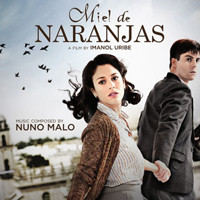- Composed by Nuno Malo
- Quartet Records / 2012 / 47:43
A Spanish film set in the Franco era shortly after the second world war, Miel de Naranjas (released – in a very limited capacity – as Orange Honey in the US) looks at the tortured emotions of a young judicial officer who witnesses the horrors of the regime and faces tough moral decisions about his work. The film didn’t do particularly well in its homeland, but did receive attention for its old-fashioned storytelling and beautiful photography (director Imanol Uribe is one of his nation’s most famous).
Young Portuguese composer Nuno Malo received much attention (not least from me) when MovieScore Media released his outstanding 2008 score for Amalia, and it’s exciting to hear another sweeping dramatic score from him. The opening piece, “La Edad de la Oscuridad”, is one of the film music highlights of the year so far, a stunningly beautiful theme featuring a particularly impressive cello solo performed exquisitely by Tina Guo. With a strong romantic element encompassing strained emotions of longing and no small amount of heartache, plus more straightforward feelings of drama from the segment where the theme is taken up by the full string section, it’s a truly portentous opening to the album which sticks long in the memory. Perhaps it’s facile to mention another piece with a cello solo and stirring parts for the whole orchestra, but I don’t think it’s a stretch to proffer John Williams’s theme from Seven Years in Tibet as a point of reference, in terms of quality as well as its orchestral setting (of course, this score doesn’t have the ethnic tint).
The bulk of the score is slightly more low key than this – it is forever dramatic, always feels like it’s really going somewhere and trying to say something, but Malo carefully restrains himself apart from the key moments. Some of the earlier, suspenseful parts of the album have a slight Herrmannesque air about them, I’d suggest; but as the score progresses, the emotions become more and more strained, the music more and more powerful, the composer managing to cast a hypnotic spell on the listener. The score veers from urgent, tense, agitated sequences, through romantic interludes, to all-out tragedy. A cue like “Tercera Ejecución” really steers the listener through the emotional wringer; the climactic “Huida” ratchets the tension up to yet another level, utterly compelling as it does so.
This is impressive, grown-up film music. For much of its time, the album explores darker territories. If I say it does so through a slightly soft focus then I’m not being condescending – more saying that, while things do become strained, the music remains forever listenable. I realise that much of my review might be construed as suggesting that it’s made up of light, summery music; and it isn’t. It certainly won’t appeal to everyone. But it appeals to me – it’s just well-written, well-performed music and possesses real emotional intelligence. Highly recommended. ****













It‘s quiet in here! Why not leave a response?